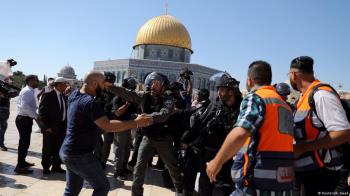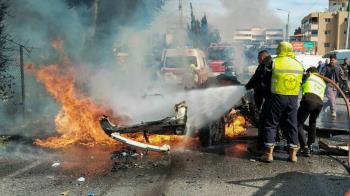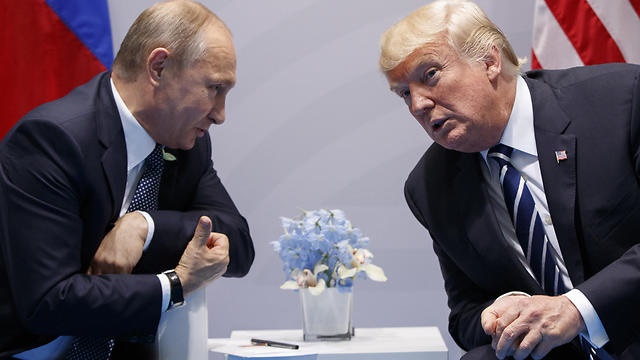Alwaght- In October last year, Trump threatened to walk out of the Intermediate-Range Nuclear Forces (INF) treaty with Russia if a new version of it was not discussed, triggering the global concerns about the beginning of a new era of missile race between the two military heavyweights. In the meantime, many countries warned of such a race. At the end of the road, the US Secretary of State Mike Pompeo in early February announced that the White House suspended the pact for 6 months, warning that the suspension was meant to pave the way for discussing a new treaty and a full exit will usher in a new Washington-Moscow arms race.
As a result of this highly opaque situation between the two global powers, the Russian President Vladimir Putin after a couple of months of US threats of withdrawal, on February 19 said that Moscow was ready to take on the US in a heated new arms race. During his annual address at the Federal Assembly, the president noted that the US missiles “take 10-12 minutes to reach Moscow”, and if left unmatched, they can pose a serious threat. He said in this case Russia will make decisions to deliver strikes not only on the US but also on the areas that host the US missiles, clearly meaning the European countries where the US has deployed nuclear warheads and missiles ready for launching. He added that Russia was “ready for another Cuban missile crisis if the US wants”, ensuring that his country had the upper hand in the first nuclear strike.
Now and after Putin speech, the speculations about the unofficial start of a new missile race age between the West and Moscow are rising. Two scenarios now rise to see where the escalating tensions between the two sides will go.
First Scenario: New global missile crisis emerging
The first scenario could be the start of a new age of nuclear rivalry between Moscow and Washington as Putin firmly expressed readiness to take on the US. Many experts already warn that the two global powers have stepped in an arms competition pretty similar to the Cold War era. The Former Soviet President Mikhail Gorbachev says the US President Trump's plan to withdraw from the Cold War nuclear weapons treaty was a reversal of efforts to achieve nuclear disarmament. Additionally, in a statement, Piers Cazalet, the NATO spokesman, said last week that Putin comments contained threatening messages to Europe. Cazalet said threats to target allies were "unacceptable," adding that the Western military alliance had "no intention of deploying new land-based nuclear weapons in Europe."
The comments suggest that many observers and diplomats now see a Cold War-style arms rivalry very likely, especially after Putin’s reference to the Cuban missile crisis, a crisis took place in 1962 when the Soviet Union decided to deploy missiles to its ally Cuba in response to the US missile deployments close to the Soviet borders. Still, this scenario’s materialization is not that certain.
The first reason for this claim is Kremlin’s unwillingness to enter such a race. A hefty chunk of Putin’s address was dedicated to the economic improvement of the country. Economic weakness, after all, remains Moscow’s Achilles heel, in case of a race with the economically powerful West. In fact, one of the key factors prompting the Soviet empire’s collapse in 1991 was the Kremlin’s decision to heavily invest in the military industries necessary for the Cold War race at a time when the economy was on shaky ground and reliant on the oil incomes. Michael Gorbachev, the last leader of the Soviet Union, borrowed tens of billions of dollars to provide the consumer goods and food for people. He also unveiled an economic reform plan. The austerity measures in a country where a majority of people were living under the protectionism of the communism stirred demonstrations that brought down one of the world’s powerful poles.
In a roughly similar situation during the last decade’s economic crisis, Russia lost nearly three-fourths of its stock market’s value. Five years ago, when the oil prices plummeted and the West imposed sanctions on Moscow for Ukraine crisis, the ruble, the Russian currency, lost half of its value against the US dollar, resulting in the longest-ever economic recession in Russia. But, on the strength of Putin’s economic policies, the national economy has managed to reverse its recession and improve. The nation’s economy is growing and the foreign currency reserves, despite the sanctions, added $125 billion over the past four years to reach $474 billion. On Wednesday, Putin said that for the first time in the history of the country the hard currency reserves could cover the foreign, trade, and state debts. He said that the country now has “strong financial safety seat” that can help develop further. In case of Russia’s entry to an apparently costly arms race, the growth will be challenged. So, Putin’s response to Trump’s suspension of the INF should be read as aimed at pressuring Washington to get Trump to the negotiating table.
Yet from another aspect, the US goal to force China into the pact is stronger than facing Russia in an arms race. Beijing, in a comment on the issue, said that the pact was a bilateral matter between Moscow and Washington and will never be multilateral. The US argues that while the pact restricts American-Russian missile development programs, China is freely and without the international supervision is completing its missile systems, mainly the long-range DF-5 missiles. Nuclear-capable and mobile-launched, this type of missile has a range between 13,000 and 15,000 kilometers and can destroy the US military facilities in Japan, South Korea, and even US mainland.
Second Scenario: Causing tensions to weather Russia-related Trump probe
With regard to Trump’s home hardships aggravated by the charges of links to the Russians, it is likely that Trump is moving towards escalation with Moscow to escape further pressures and even impeachment.
Also, after John Bolton was appointed the national security advisor, the US pullout of the international agreements moved even faster. Now Washington is breaking with the security commitments to all of its Western and Arab allies. Quitting the INF could fall under this Bolton-prompted foreign policy trend. But there is a distinction here. This time the home front is engaged and the exit intends to distract the public and prosecutors from Trump case he has been struggling with since his assumption of office at the White House.



























